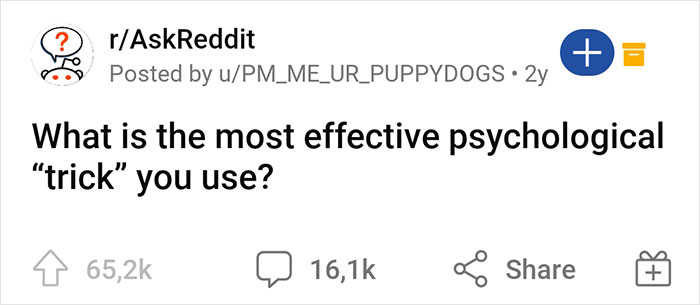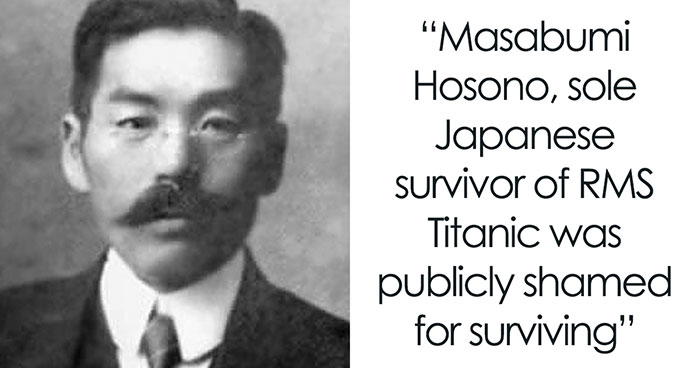
People Are Sharing Effective Psychological Tricks They Use And Here’re 30 Of The Most Interesting Ones
The charm of the world around us is that it’s totally unpredictable. It puts us into the most unlikely, annoying, and challenging scenarios where we have to find our way through. And while some believe in luck, or lack thereof, others like to take matters into their own hands and use some pragmatic strategies. Like, psychological tricks.
And it turns out, most people have one ready when a particular situation strikes. From answering to “Why’s” in such a way that you redirect the question back to avoiding office small-talk so that nobody thinks you’re rude, to making yourself look like less of a self-obsessed jerk simply by replacing “I know” with “You’re right,” these are some of the biggest psychological tricks.
Shared in the comment section for the question “What is the most effective psychological 'trick' you use?” on r/AskReddit, some people seem to really know how to nail the mental game big time.
This post may include affiliate links.
 My 4-year-old got into the 'Why?' phase a little while back. I read an article that said the best way to get them to stop was to ask them, 'I'm not sure, what do you think?' It is a godsend. They answer their own question, you provide some feedback, and they immediately move on. [Freaking] awesome.
My 4-year-old got into the 'Why?' phase a little while back. I read an article that said the best way to get them to stop was to ask them, 'I'm not sure, what do you think?' It is a godsend. They answer their own question, you provide some feedback, and they immediately move on. [Freaking] awesome.
 I work in an office. When people stop by my desk and refuse to leave me alone, I get up and refill my water bottle while they are talking to me. Instead of walking back to my desk, I walk them to theirs. They instinctively will sit down. Then I just sever the conversation and get back to work.
I work in an office. When people stop by my desk and refuse to leave me alone, I get up and refill my water bottle while they are talking to me. Instead of walking back to my desk, I walk them to theirs. They instinctively will sit down. Then I just sever the conversation and get back to work.
 When my wife is talking to a man about something technical, often he'll talk back to me. When that happens I turn to face my wife, which forces his attention where it should be.
When my wife is talking to a man about something technical, often he'll talk back to me. When that happens I turn to face my wife, which forces his attention where it should be.
I do this when there are two people listening to someone tell a story and, for whatever reason, the person talking is only focusing on me but I wish they would instead focus kn the other person.
To find out what an expert has to say about these psychological tricks, Bored Panda reached out to Susan Petang, a certified life coach, teaching adults and teens. Susan runs “The Quiet Zone Coaching” and she has now prepared a set of essential life skills and solution for anyone who’s preparing for the post-pandemic world.
When it comes to mind tricks, Susan said that everyone uses one from one time to time, even if they're unaware they're doing it. Moreover, “There are many psychological tricks floating around out there—I couldn't possibly name them all,” the life coach explained.
 To avoid workplace drama and be liked, compliment people behind their back.
To avoid workplace drama and be liked, compliment people behind their back.
 Be direct and personal when you need things. Instead of asking IF anyone has an EpiPen, ask WHO has an EpiPen. Instead of saying, 'Someone call 911,' point to someone and say, 'Go call 911 and come tell me when they are on the way.
Be direct and personal when you need things. Instead of asking IF anyone has an EpiPen, ask WHO has an EpiPen. Instead of saying, 'Someone call 911,' point to someone and say, 'Go call 911 and come tell me when they are on the way.
 If you look happy to see someone every time you see them, they will eventually be happy to see you.
If you look happy to see someone every time you see them, they will eventually be happy to see you.
“One I use frequently (which isn't really a 'trick,' but a communication tool) is called reflective listening,” Susan said and added: “Often other people just want to be heard, and this tool provides not only that, but helps clarify information so misunderstandings don't occur.”
Some examples of the reflective listening include: "It sounds like you feel...", "I'm hearing that you want...", "It seems like you're upset about...", "I see that you're feeling..."
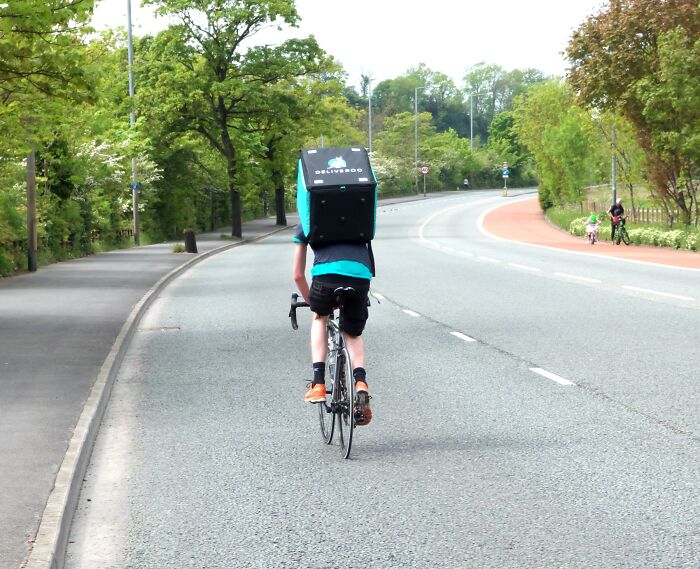 Don’t apologise. Thank them.
When you’re delivering food that’s taken a while to cook don’t say “sorry for the delay,” say “thanks for your patience”
Saying sorry focuses on your fault. Thanking focuses on their good quality.
Don’t apologise. Thank them.
When you’re delivering food that’s taken a while to cook don’t say “sorry for the delay,” say “thanks for your patience”
Saying sorry focuses on your fault. Thanking focuses on their good quality.
I actually do this with my kids when I can't get them what they want/need right away. It really does make a difference and reinforces positive behavior.
 I currently manage around 240 people among six restaurants. It is often hard to get them to do what is needed. I have found that saying, 'I need your help' is effective in getting them on board. People want to feel needed and that they are making a difference. Expressing that need to them as much as possible makes all the difference in the world.
I currently manage around 240 people among six restaurants. It is often hard to get them to do what is needed. I have found that saying, 'I need your help' is effective in getting them on board. People want to feel needed and that they are making a difference. Expressing that need to them as much as possible makes all the difference in the world.
Identify employees to be in charge of certain parts of the process ... if the drink station is always a mess, identify someone to routinely check on it and clean/organize as needed. If you see the drink station in chaos, go back to the person you put in charge and figure out what the issue is ... if "everybody" in charge of something, then "no one" is in charge because non one takes responsibility.
Great advice! It also works managing a home. When I need help getting things back on track I'll assign each person a specific job and it works so much better than everyone trying to guess where to start and what to prioritize.
Load More Replies...I manage a team of white collar insurance folk. I constantly remind them "we give medical care to injured people. We fight criminal scammers. We are on the side of the angels. Stand proud." I know there's a lot of bad claim shops. But in mine we Pay What We Owe and we work with an open heart. My folks know they touch real lives and don't feel anything like office drones. I like to think we can be a model for the industry but it may be just that I'm really a zen hippie, currently disguised as a manager.
Works well with children too. "Go clean the bathroom" vs. "I need your help to clean the bathroom." And then, "thank you so much for cleaning the bathroom, it made my day so much easier because I had to do x,y,z and that was one thing that I knew was taken care of."
I have had a few supervising jobs in the past and each time someone had completed a task i always used to compliment them and say " Good man" This makes them feel that their work is not unrecognized. When you treat people like crap they will crap on you behind your back. If i have a negative on one of my students work i always start with a positive. When i have pointed out their mistake i then ask them how they could make it better.
However, "help" isn't something you get paid for. Help is something that is given. I'm a freelancer and I've learned that potential clients who come to me needing "help" on a project aren't the kind of clients who are interested in paying invoices.
Yup, I've used this when I needed to tackle a work colleague of equal pegging doing something that was making problems for me (not deliberately). Saying that I needed her help really set her up to listen rather than feel defensive, but it also made me frame my request in such a way that it didn't sound critical of her either.
In my country 80% of all workers are unionized. It's not the union that is the problem.
Load More Replies...  Don’t say “it’s okay” when someone apologizes. Say something like, “thank you for apologizing.”
if someone needs to apologize to you, then it was something that isn’t okay. my mom teaches this to her kindergartners and it really does make a difference. opens doors for growth and conversation too. “thank you for apologizing, I don’t like it when you hit me.” or whatever.
Don’t say “it’s okay” when someone apologizes. Say something like, “thank you for apologizing.”
if someone needs to apologize to you, then it was something that isn’t okay. my mom teaches this to her kindergartners and it really does make a difference. opens doors for growth and conversation too. “thank you for apologizing, I don’t like it when you hit me.” or whatever.
In fact, “a lot of those little psychological 'tricks' we use come from our families. We either mimic what we hear growing up, or do the opposite because, as we are more aware of those around us as we mature, we find the way we learned to communicate from our parents distasteful.”
Susan warns that “if you try using a style or a trick that doesn't feel right to you, it'll come off sounding fake and manipulative.”
 Instead of asking, 'Do you have any questions?' I ask, 'What questions do you have?' The first almost always results in silence, while the second helps people feel comfortable asking questions.
Instead of asking, 'Do you have any questions?' I ask, 'What questions do you have?' The first almost always results in silence, while the second helps people feel comfortable asking questions.
 Saying 'You're right!' instead of 'I know' makes you look less like a [jerk] and doesn't diminish something someone else may have just found out.
Saying 'You're right!' instead of 'I know' makes you look less like a [jerk] and doesn't diminish something someone else may have just found out.
 On an airplane, if my seatmate is hogging the armrest or being too chatty, I grab the barf bag. Works every time.
On an airplane, if my seatmate is hogging the armrest or being too chatty, I grab the barf bag. Works every time.
On the other hand, one should use mind tricks and tools with caution since Susan warned that it is possible to do more harm than good with little psychological tricks. “For example, one little trick I read about is thanking someone for a trait they don't have. While that is usually very effective, it can backfire. For example, if you thank a coworker for being patient when she wasn't, she may think you're accepting her impatient behavior as 'patient'—and behave that way again.”
She also said that “Every situation and person is different. It's tough to create blanket techniques for dealing with others that are always effective, so learning to read the moods and motivations of others is a great skill.”
 When somebody shy is speaking, if you look at them and nod your head, it encourages them to keep talking.
When somebody shy is speaking, if you look at them and nod your head, it encourages them to keep talking.
 give kids 2 choices instead of letting them pick from whatever
you control.
could be 2 points of time. like "now" or in 10 minutes,
or do you want the red or the blue shirt on
things like that
works wonderfully. they feel in control, but have absolutely no control.
can work with some adults too
give kids 2 choices instead of letting them pick from whatever
you control.
could be 2 points of time. like "now" or in 10 minutes,
or do you want the red or the blue shirt on
things like that
works wonderfully. they feel in control, but have absolutely no control.
can work with some adults too
Yes! That's a good trick! If you leave too much choice, they will be indecisive, but give them option A or B and it will be easier to choose and they'll be happy with the results because they 'decided' the outcome.
 When I do something bothersome to my husband and he goes quiet, I wait a few minutes and then ask him a seemingly innocent question, usually on the subject of how certain parts of a car works. This gets him talking about the car thing and he rambles for like five minutes, and then, bam! He’s happy again and not quietly brooding. I’ll never tell him I do this because I’m afraid it won’t work anymore if he knows about it. It’s foolproof, though; it works every single time, no matter how bothered he is.
When I do something bothersome to my husband and he goes quiet, I wait a few minutes and then ask him a seemingly innocent question, usually on the subject of how certain parts of a car works. This gets him talking about the car thing and he rambles for like five minutes, and then, bam! He’s happy again and not quietly brooding. I’ll never tell him I do this because I’m afraid it won’t work anymore if he knows about it. It’s foolproof, though; it works every single time, no matter how bothered he is.
If you ever wonder whether anything you say or do may harm another person, you may want to ask yourself a couple of check-up questions. Susan counsels her clients to ask themselves these questions when they need to decide what to say or how to behave: “Am I hurting someone else?” (Think carefully!); “Am I hurting myself?” (Think carefully!); “Am I willing to accept the consequences of this action?”; “Does this fit in with my value system?”; “Would the person I want to be (or my hero) do or say this?”; “Is it kind?” (Kindness trumps honesty every time—unless someone is about to walk off a cliff!)
 "Tell me about your day. " instead of "How was your day?"
I do it when I really want to chat with a person and not get the usual "It's been OK" then nothing out of them after that.
Heard it on reddit a while back and I am amazed at how well it works. You get some info out of the person that you can maybe relate to, or help with or share similar ideas/stories.
"Tell me about your day. " instead of "How was your day?"
I do it when I really want to chat with a person and not get the usual "It's been OK" then nothing out of them after that.
Heard it on reddit a while back and I am amazed at how well it works. You get some info out of the person that you can maybe relate to, or help with or share similar ideas/stories.
 When I have something important to say to my kids, I say it very quietly so that they listen. They're immune to my yelling, but whispering gets their attention.
When I have something important to say to my kids, I say it very quietly so that they listen. They're immune to my yelling, but whispering gets their attention.
 If you need to deescalate someone and get them to communicate, ask them questions about numbers or personal information. I work in emergency services. If someone is totally distraught and shut down, asking their phone number, address, Social Security number, or birth date can pull them out of an emotional place and bring them back to a headspace where they can talk about what happened more easily. I often ask these questions even after I have the information, just to deescalate.
If you need to deescalate someone and get them to communicate, ask them questions about numbers or personal information. I work in emergency services. If someone is totally distraught and shut down, asking their phone number, address, Social Security number, or birth date can pull them out of an emotional place and bring them back to a headspace where they can talk about what happened more easily. I often ask these questions even after I have the information, just to deescalate.
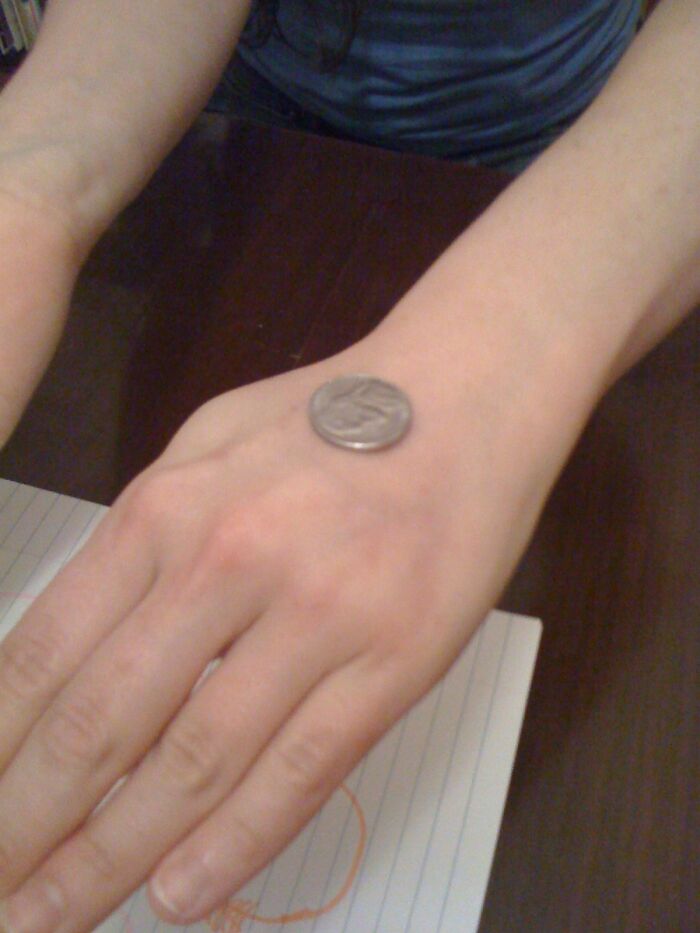 At this point it's pretty well known, but Ive been using it for a few decades and has a special spot for me because I 'came up with it' (and was probably the 3 billionth person to 'come up with it').
Flip a coin if you cant decide something, and then follow whether or not you feel happy or disappointed with the result that it gives you.
At this point it's pretty well known, but Ive been using it for a few decades and has a special spot for me because I 'came up with it' (and was probably the 3 billionth person to 'come up with it').
Flip a coin if you cant decide something, and then follow whether or not you feel happy or disappointed with the result that it gives you.
 I have a coworker who is an excessive talker. She has a heart of gold and means no harm whatsoever, but I don't have time to listen to her stream of consciousness every day. Anytime she comes into my office to chat, I give her a minute to get the gist out, and then I stand and walk out of my office. She always follows and continues yammering, and we walk right back to her cubicle. Sometimes I'll ditch her in the hallway under a guise of forgetting something at my desk. She hasnt noticed yet that I've been walking her back to her desk for months.
I have a coworker who is an excessive talker. She has a heart of gold and means no harm whatsoever, but I don't have time to listen to her stream of consciousness every day. Anytime she comes into my office to chat, I give her a minute to get the gist out, and then I stand and walk out of my office. She always follows and continues yammering, and we walk right back to her cubicle. Sometimes I'll ditch her in the hallway under a guise of forgetting something at my desk. She hasnt noticed yet that I've been walking her back to her desk for months.
 Put headphones in and play the music that fits your hoped-for mood. It shifts me over to it mentally. It really helps when I need to calm down or when I need to feel happier.
Put headphones in and play the music that fits your hoped-for mood. It shifts me over to it mentally. It really helps when I need to calm down or when I need to feel happier.
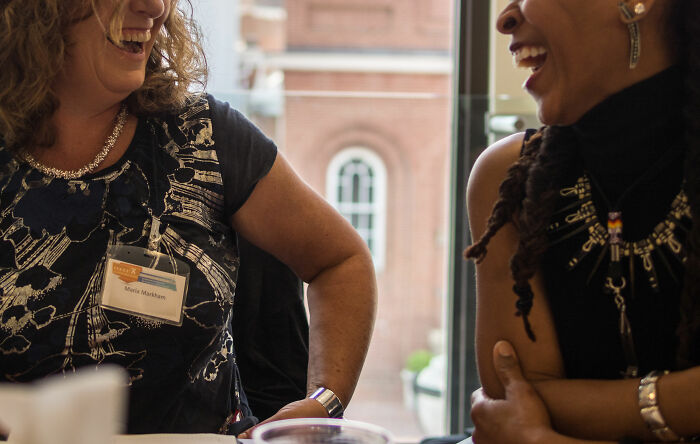 When you are standing in a group and somebody tells a joke or something funny happens, people tend to look towards the person they like the most while laughing.
When you are standing in a group and somebody tells a joke or something funny happens, people tend to look towards the person they like the most while laughing.
 If you're trying to pick out dinner with your partner, rather than ask, 'What do you want?' and getting the typical 'I don't know, anything' answer and then having suggestions shot down, start with, 'What do you NOT want? Used it a few times in some of my relationships, and it's the godsend question
If you're trying to pick out dinner with your partner, rather than ask, 'What do you want?' and getting the typical 'I don't know, anything' answer and then having suggestions shot down, start with, 'What do you NOT want? Used it a few times in some of my relationships, and it's the godsend question
 If I desperately need to poo and I'm on my way to the bathroom (eg. driving home or walking to one) I'll imagine it in my mind as being really far away. This stops the urgency and I find I can get there calmly :-)
If I desperately need to poo and I'm on my way to the bathroom (eg. driving home or walking to one) I'll imagine it in my mind as being really far away. This stops the urgency and I find I can get there calmly :-)
 If you need to remember something, think about it while doing something noticeably unusual. This will pair the memory with the "something", so that when it is noticed later on it will trigger that particular memory.
e.g. I need to take out the garbage before going to bed.
Put your pillow at the foot of your bed.
If you need to remember something, think about it while doing something noticeably unusual. This will pair the memory with the "something", so that when it is noticed later on it will trigger that particular memory.
e.g. I need to take out the garbage before going to bed.
Put your pillow at the foot of your bed.
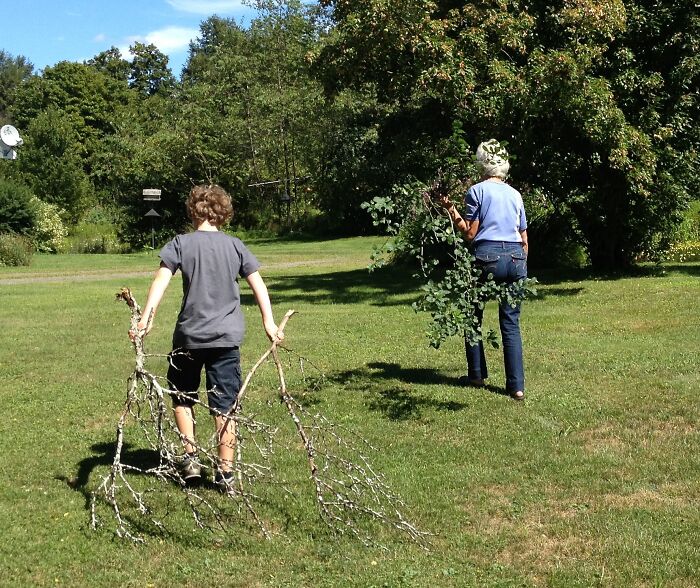 Making people think that you need them is always better than asking them to simply do something for you.
i.e: instead of saying: "Can you do this for me?" you should say: "Listen I need you help; I can't do this."
Makes people feel good about themselves and even like you on a deeper level.
Making people think that you need them is always better than asking them to simply do something for you.
i.e: instead of saying: "Can you do this for me?" you should say: "Listen I need you help; I can't do this."
Makes people feel good about themselves and even like you on a deeper level.
This is certainly true, but please don't make it obvious that you're just using a trick on them. It would be nice if you actually meant it. I've been tricked like this multiple times by one person in charge in my first workplace. I fell for for it and felt incredibly flattered, but then I caught on and just felt stupid. I still do, and it's a LONG time ago.
 Say hello to everybody you know, and say it with a smile. Just imagine: If someone walks into you twice a year and both times you smile and greet them enthusiastically, they will think of you as a nice person. So little effort for a person to find you friendly!
Say hello to everybody you know, and say it with a smile. Just imagine: If someone walks into you twice a year and both times you smile and greet them enthusiastically, they will think of you as a nice person. So little effort for a person to find you friendly!
"Hmmm Donny smiled at me both times I saw him, but both times he stole my wallet....I'm torn"
 This is dumb and shouldn't work. But I'm a bartender. And if I ask someone if they want another drink and nod my head at the same time most people are inclined to do it.
This is dumb and shouldn't work. But I'm a bartender. And if I ask someone if they want another drink and nod my head at the same time most people are inclined to do it.
Listen to someone without giving advice or asking for more information. This typically gets me more information than if I were to be pushy about it.
 To deescalate a situation or someone who is prone to violence, address them at one or two emotional levels below where they are. For example, If their anger is at a level 10, then you should come in at a level 8. Being completely calm, reserved, and polite only pisses people off more because you 'clearly don't understand the magnitude of the situation. If they are screaming and yelling, you need to come in loud — while not attacking them, and agreeing with them (to a point). When you agree with their anger, they are more open to listening to you. Works pretty much every time, though there may be a little up and down in the middle. Just follow the person's lead, while always being a level below them.
To deescalate a situation or someone who is prone to violence, address them at one or two emotional levels below where they are. For example, If their anger is at a level 10, then you should come in at a level 8. Being completely calm, reserved, and polite only pisses people off more because you 'clearly don't understand the magnitude of the situation. If they are screaming and yelling, you need to come in loud — while not attacking them, and agreeing with them (to a point). When you agree with their anger, they are more open to listening to you. Works pretty much every time, though there may be a little up and down in the middle. Just follow the person's lead, while always being a level below them.
I purposely get more calm when I fight with my mom. She gets more angry the more calm I get. It's kind of funny, but I do it in the hopes of calming her down. I'm soft spoken and she's a loud-mouth in general. I guess I could try this, but honestly, going from a 1 to a 5 would even be really hard for me.
 My husband says, 'I will give you $50 if you hiccup two more times.' It works amazingly well — he's never had to pay me.
My husband says, 'I will give you $50 if you hiccup two more times.' It works amazingly well — he's never had to pay me.
 Thank someone for a trait you want them to have. Instead of telling a customer you’re sorry for the wait, tell them, 'Thank you for your patience or understanding.' Works wonders."
Thank someone for a trait you want them to have. Instead of telling a customer you’re sorry for the wait, tell them, 'Thank you for your patience or understanding.' Works wonders."
 I’m a professional poker player. When I am in a pot with one other player, I often try to make them laugh when they are thinking about what to do. If you can get them to laugh, it sets them in a mood where they are unlikely to bluff.
I’m a professional poker player. When I am in a pot with one other player, I often try to make them laugh when they are thinking about what to do. If you can get them to laugh, it sets them in a mood where they are unlikely to bluff.
I used to play poker in college, just $20 pots, nothing big. But I don't drink! Just don't like the flavor or the effect on me. Yeah, try being the only sober guy playing poker. Hilarious and profitable!
When you’re talking to someone, they will naturally fill silence. It’s subconscious. If you want them to keep talking, keep your own mouth shut. This is useful if you’re ever in a verbal altercation.
Plus, it's fun to listen to someone dig their hole deeper and deeper while you stand there incredulous.
This isn't something I've used but I think it's worth sharing. Derren Brown said that once there was a muscley drunk guy that wanted to beat him up and said the classic "what are you looking at." Derren replied with "the wall outside my house is four feet tall." The idea is that it puts the aggravated person on the back foot and takes them out of that adrenaline filled state. Anyways he sat down and the guy started crying to him about his gf. He is Derren Brown though so I wouldn't recommend this to everyone
 I work as a Creative Director. I have a lot of great clients, unfortunately with a few bad managers from their side. They usually go with the mantra of "If it's not my idea, it's not a good idea". I end up (sometimes) telling them about something Google, Tesla, Amazon, Samsung, Etc. is doing, and how we could try it. They jump at these ideas. The ideas are actually mine or my teams. Works like a charm.
Use this sparingly. Using it as an easy escape is not a good idea. It works, but know when to use it. If you use it all the time, it won't make you look any better. It will also allow people to be promoted who aren't capable of doing the job (pointed out by rutefoot [ Thank you]). Good luck everyone!
I work as a Creative Director. I have a lot of great clients, unfortunately with a few bad managers from their side. They usually go with the mantra of "If it's not my idea, it's not a good idea". I end up (sometimes) telling them about something Google, Tesla, Amazon, Samsung, Etc. is doing, and how we could try it. They jump at these ideas. The ideas are actually mine or my teams. Works like a charm.
Use this sparingly. Using it as an easy escape is not a good idea. It works, but know when to use it. If you use it all the time, it won't make you look any better. It will also allow people to be promoted who aren't capable of doing the job (pointed out by rutefoot [ Thank you]). Good luck everyone!
I used to be a creative director. Clients would often ask, "Why can't we just do what so-and-so is doing?" And I'd have to answer, "Because they're already doing it, it would infringe on their copyright, and your potential customers would think you're unoriginal."
 When you're in an argument, find something to agree on, then push your main point.
When you're in an argument, find something to agree on, then push your main point.
I have to work with kids a lot, having a summertime “job” where I volunteer to assist counselors at a camp for service hours and having five younger siblings. DONT tell them not to do something. If I told you, “DONT THINK ABOUT UNICORNS!” you’ll immediately think about unicorns for the split second I say it. If I instead said, “THINK ABOUT TURTLES!” you’ll think about turtles for at least that split second I said it. Don’t tell a kid not to something, rather tell them to do something else. Instead of “Don’t hit your sister!” say, “Let’s play a nice game with your sister.” That way you don’t put the idea into their mind that you don’t want them doing it, which, in their childish manner, fuels the fire to do it more.
Sorry, children SHOULD be told there are things they cannot do, and it should certainly be made clear from a very young age that violence is not acceptable. So you just rewarded a child that hit his or her sister with a game.... chew on that for a bit.
I work with a bunch of idiot lawyers, and I use the phrase 'You’re correct' all the time. Even if it’s one teeny, tiny thing they’re correct about, it makes them feel smart and they instantly soften. It also keeps them listening because they’re hoping more flattery will come down the pike.
This could backfire too. They might end up thinking that they are always the smartest person in the room, even if they aren’t.
If someone says they have the hiccups, ask them to prove it. 9/10 times, their hiccups will disappear. Having to summon a hiccup in order to demonstrate will trick your diaphragm into just Not Hiccuping. I've been able to twist it around on myself with some success as well, but it takes practice. You realize you have hiccups, then /try/ to hiccup. Actively try to make yourself do another one. It'll stop.
I don’t know if this counts but if someone is crying or having a hard time DONT say it’s ok. It’s not ok. They are upset and not ok. Instead say like that’s seems really hard or yeah that guy is a jerk.
Sometimes all people need is a sympathetic, unjudgmental ear.
Load More Replies...Too be honest, a lot of these tricks are awfully manipulative and often used by abusers. It's a fine line to thread, be careful.
I think most of these tricks are innocent enough - and using them won't turn you into an abuser. That said, manipulative people will use them and others, for sure.
Load More Replies...Love the post, but the amount of negative comments on here is astronomical.
When I worked at a petrol station as an attendant, on sunny days I wanted to be outside and pumping peoples fuel for them. But when it was raining I hated it out there. So I found it's all in how you ask. If I asked "do you need any help?" 90% of people reflexed answered "no", and I could walk back inside out of the rain, you'd get caught by that ten percent but it still had you going back inside soon enough. If I wanted to stay out I'd ask "can I do that for you" and seriously the percentages flipped, I'd say 90% of people answered "yes" to that, as soon as I'd finish with a car another would be there and I'd ask again and they'd say yes too, so then I could stay out in the sun pretty much for as long as I wanted.
When you want someone to be more agreeable, ask a question he/she HAS to answer with "Yes". When they once have said yes, they will be more open. If a person is shy, lower your voice and speak slowly and not too loud.
The yes-trick is a dangerous weapon when it is in the hands of sales people.
Load More Replies...Sometimes if i want something or want to do something but i need permission, ill tell the person that im going to do it instead of asking if i can. "Im going to get icecream with my friends" instead of "can i get icecream with my friends"
Many of these are active vs passive voice. In order to help in situations it's oftentimes better to be an active voice, using action verbs. When we speak passively it can oftentimes lead to being steamrolled/seen as indecisive or aloof. Not in every situation mind you, just a generalization. This also works with listening, being an active listener validates the speaker. You don't have to interject thoughts but maintaining eye contact, non verbal communication and sympathy/empathy really goes a long way.
Some of these are really good ideas, but a lot are just manipulative. You should *mean* it when you ask for help, and be prepared to *do* something, not just pass it off to someone else.
I think that few of these techniques actually address the person's needs or interests. They are ways of manipulating someone.
Handing someone something random is a very fun thing to do. If you’re engaged in a conversation and hand them something it works the best, they’ll just take it.
This is off topic but does it say "eople" at the title for anyone else?
I would be completely weirded out if someone listen or talks to me with their eyes closed. That is definitely not an acceptable social behaviour in NL.
Load More Replies...I don’t know if this counts but if someone is crying or having a hard time DONT say it’s ok. It’s not ok. They are upset and not ok. Instead say like that’s seems really hard or yeah that guy is a jerk.
Sometimes all people need is a sympathetic, unjudgmental ear.
Load More Replies...Too be honest, a lot of these tricks are awfully manipulative and often used by abusers. It's a fine line to thread, be careful.
I think most of these tricks are innocent enough - and using them won't turn you into an abuser. That said, manipulative people will use them and others, for sure.
Load More Replies...Love the post, but the amount of negative comments on here is astronomical.
When I worked at a petrol station as an attendant, on sunny days I wanted to be outside and pumping peoples fuel for them. But when it was raining I hated it out there. So I found it's all in how you ask. If I asked "do you need any help?" 90% of people reflexed answered "no", and I could walk back inside out of the rain, you'd get caught by that ten percent but it still had you going back inside soon enough. If I wanted to stay out I'd ask "can I do that for you" and seriously the percentages flipped, I'd say 90% of people answered "yes" to that, as soon as I'd finish with a car another would be there and I'd ask again and they'd say yes too, so then I could stay out in the sun pretty much for as long as I wanted.
When you want someone to be more agreeable, ask a question he/she HAS to answer with "Yes". When they once have said yes, they will be more open. If a person is shy, lower your voice and speak slowly and not too loud.
The yes-trick is a dangerous weapon when it is in the hands of sales people.
Load More Replies...Sometimes if i want something or want to do something but i need permission, ill tell the person that im going to do it instead of asking if i can. "Im going to get icecream with my friends" instead of "can i get icecream with my friends"
Many of these are active vs passive voice. In order to help in situations it's oftentimes better to be an active voice, using action verbs. When we speak passively it can oftentimes lead to being steamrolled/seen as indecisive or aloof. Not in every situation mind you, just a generalization. This also works with listening, being an active listener validates the speaker. You don't have to interject thoughts but maintaining eye contact, non verbal communication and sympathy/empathy really goes a long way.
Some of these are really good ideas, but a lot are just manipulative. You should *mean* it when you ask for help, and be prepared to *do* something, not just pass it off to someone else.
I think that few of these techniques actually address the person's needs or interests. They are ways of manipulating someone.
Handing someone something random is a very fun thing to do. If you’re engaged in a conversation and hand them something it works the best, they’ll just take it.
This is off topic but does it say "eople" at the title for anyone else?
I would be completely weirded out if someone listen or talks to me with their eyes closed. That is definitely not an acceptable social behaviour in NL.
Load More Replies...
 Dark Mode
Dark Mode 

 No fees, cancel anytime
No fees, cancel anytime 






